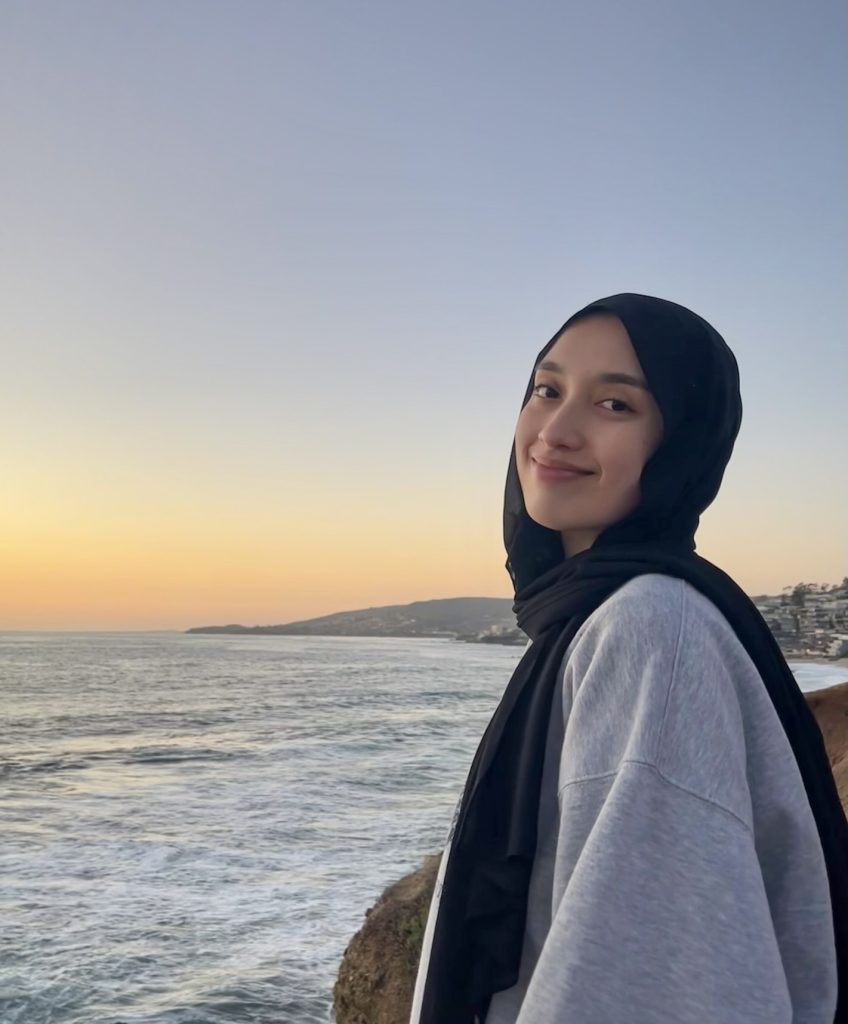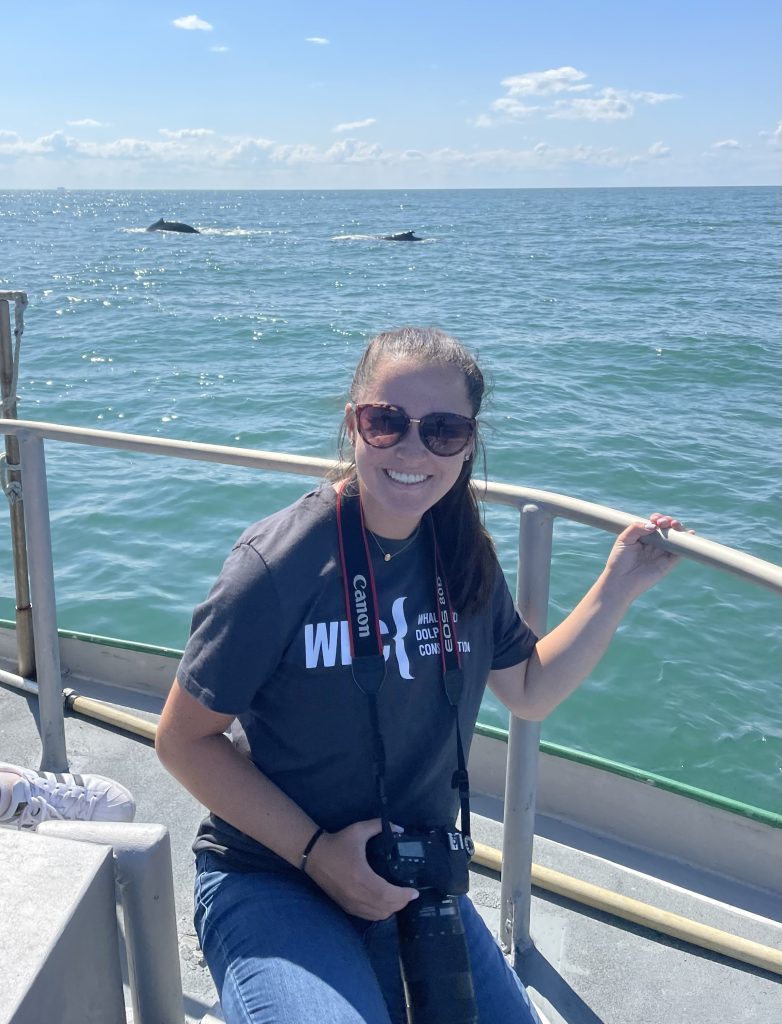Ph.D. Students
Annie Harshbarger
I’m a PhD candidate in Marine Science & Conservation, and I am broadly interested in collective movement ecology, group decision-making, and other social processes that could impact cetaceans’ resilience to conservation threats. My dissertation research focuses on group coordination and individuals’ influence over group decision-making during foraging dives in groups of short-finned and long-finned pilot whales. Using digital acoustic tags (DTAGs) and unoccupied aircraft systems (UAS, or drones), I will identify factors that influence movement decisions whales make at several points throughout a dive – including horizontal movement at the surface, individual paths during foraging, and reunification with group members during ascent – allowing social groups to maintain cohesion over time.
Before starting my PhD, I completed my B.S. in Environmental Sciences and Biology at Duke. My undergraduate research with the Duke Marine Robotics and Remote Sensing Lab and the NOAA Hawaiian Monk Seal Research Program focused on the behavioral response of wildlife to UAS, with the goal of developing species-specific best practices for the use of UAS as a tool for conservation research. After completing my undergraduate studies, I collected sightings and behavior data on large cetaceans in the Gulf of Maine as a research assistant for Allied Whale.
Email: anne.harshbarger@duke.edu

Arona Bender
My research interests broadly encompass conservation strategies for the recovery and maintenance of marine vertebrate populations. Using satellite-linked telemetry, my dissertation research focuses on exploring patterns and variations of sea turtles nesting in Guyana with the goal of describing their inter-nesting habitats, foraging grounds, and migratory corridors. Additionally, I will employ an innovative monitoring protocol that involves using drones equipped with thermal cameras to survey remote nesting beaches, thereby enhancing data gathering efforts in this region. Prior to starting my PhD, I received a B.S degree in Biological Sciences from Georgia State University, followed by a M.S degree in Biology with a concentration in Marine and Environmental Science from Hampton University as a NOAA Living Marine Resources Cooperative Science Center (LMRCSC) graduate fellow. My master’s thesis focused on estimating the effective population size and historical demography of leopard seals (Hydrurga leptonyx) in the Antarctic Peninsula using molecular genetic methods.
Email: arona.bender@duke.edu
Linkedin: https://www.linkedin.com/in/arona-bender-144502107/

Maddie Paris
I’m interested in pinniped conservation ecology and the implications of range-expanding species. My research focuses on the small seasonal population of harbor seals in North Carolina and investigates the ecological and social impacts of this range-expanding population. Prior to beginning my PhD, I earned a B.S. in Biology and Environmental Sciences from Duke University and a MSc in Marine Mammal Science from the University of St Andrews. My undergraduate thesis work examined Southern sea otter and seabird habitat use in the Elkhorn Slough National Estuary Research Reserve and the possible impacts of human disturbance. For my master’s thesis, I mapped potential harbor seal conservation sites in the Wash, England using telemetry tag data across different years and seasons to understand the temporal stability of these sites and to provide management recommendations. I also spent a field season conducting boat-based surveys in Shark Bay, Australia with the Shark Bay Dolphin Project and worked for the Duke Marine Geospatial Ecology Lab as a research technician and social communications manager.
Email: madeleine.paris@duke.edu

Master’s Students

Maryam Krauss
I’m a second-year Master of Environmental Management (MEM) student concentrating in Coastal and Marine Systems. My research interest broadly encompasses marine vertebrate conservation, specifically through utilizing interdisciplinary approaches to address and mitigate human-wildlife conflict and inform species conservation strategies. For my Master’s, I’m looking into fishermen’s perceptions of harbor seals in the Outer Banks/Virginia Beach area in response to their seasonal population. Prior to Duke, I completed my B.S. in Animal Ecology at Iowa State University with a focus on fisheries and aquatic science. My undergraduate research involved utilizing social media data to observe recreational fishing behavior in the San Francisco Bay Area with colleagues and mentors from Stanford University’s Hopkins Marine Station.
Email: maryam.krauss@duke.edu

Tori Newton
I’m a second year Masters of Environmental Management student focused on coastal and marine systems and community engagement and environmental justice. My research interests broadly encompass marine mammal conservation, reducing human-wildlife interactions, and community engagement through science education. My Masters Project research focuses on evaluating the effectiveness of gear marking schemes for aerial detection of North Atlantic right whale (NARW) entanglements. My research analyzes the gear marking schemes of the United States and Canada to provide a critical assessment and recommendations about how to proceed to better protect NARWs. This project is in collaboration with the Center for Coastal Studies Marine Animal Entanglement Response Program.
Before starting my masters, I completed my B.S. in Biology and Environmental Studies at Boston College. During my undergraduate studies, I spent a field season conducting boat-based research aboard a whale watch vessel in the southern Gulf of Maine. After completing my undergraduate studies, I worked as a science educator at the New England Aquarium, engaging with guests of all ages to inspire, inform, and empower visitors to protect the blue planet.
Email: tori.newton@duke.edu
LinkedIn: www.linkedin.com/in/tori-newton
